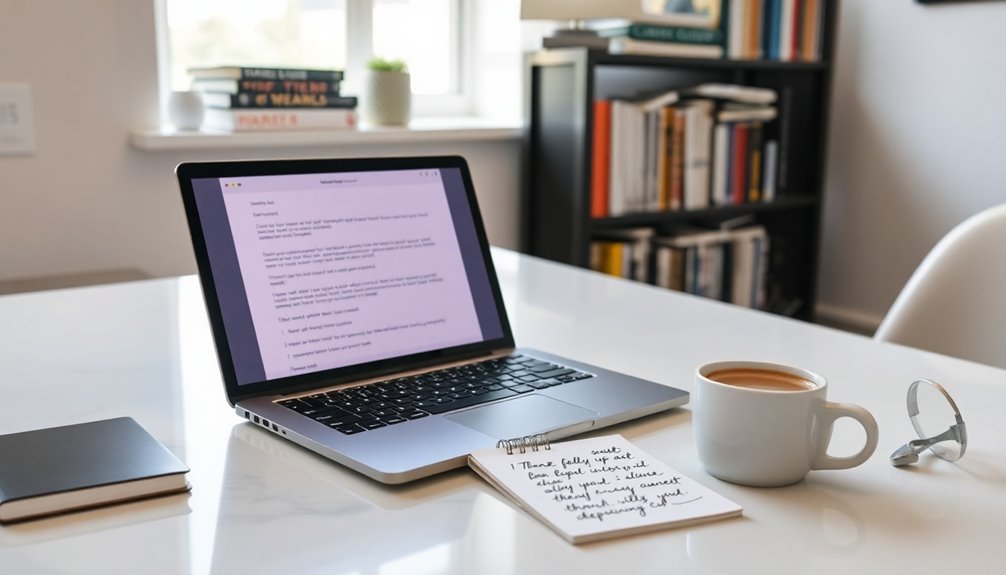Revealing the secrets of screening interviews is all about preparation and confidence. Start by reviewing the job description and researching the company's culture. Know your resume inside out, emphasizing relevant achievements. Practice common questions like "Why should we hire you?" and craft thoughtful questions to ask. During the interview, maintain eye contact, smile, and listen actively to show your enthusiasm. A positive demeanor can make a significant impact. After the interview, send a thank-you note to express your appreciation. By mastering these strategies, you'll position yourself as a strong candidate, ensuring you're ready for what comes next.
Key Takeaways
- Understand the job description to align your qualifications and experiences with the position's requirements effectively.
- Research the company's culture, products, and market position to tailor your responses and demonstrate genuine interest.
- Prepare for common screening questions to articulate your skills and motivations confidently during the interview.
- Showcase strong communication skills through active listening, eye contact, and a positive demeanor to create rapport with the interviewer.
- Follow up with a personalized thank-you note to reinforce your interest and appreciation after the interview.
What Is a Screening Interview?

A screening interview is often the first step in the job selection process, where recruiters assess your qualifications and fit for the position.
This initial interview typically involves a recruiter describing the company and the role you're applying for. You'll encounter questions aimed at gauging your basic skills, experiences, and enthusiasm for the position.
Expect this interview to be conducted either in-person or over the phone, depending on the company's preference. Your responses will help recruiters determine if you meet the fundamental requirements.
It's crucial to present yourself clearly and confidently, showcasing your interest in the role. Remember, this is your chance to make a strong first impression, so be prepared to engage actively in the conversation.
Key Preparation Techniques

How can you effectively prepare for a screening interview? Start by reviewing the job description closely to understand the qualifications and responsibilities required.
Next, research the company's products, culture, and market position to show genuine interest.
Know your resume inside and out, highlighting relevant accomplishments that align with the role.
Practice answering common screening questions with a friend to build confidence and clarity in your responses.
Additionally, prepare thoughtful questions to ask the interviewer, demonstrating your engagement and curiosity about the company.
Finally, choose a quiet location for phone interviews and make sure you're ready to convey enthusiasm and positivity throughout the conversation.
This preparation will set you on the path to success.
Common Screening Questions

During a screening interview, you'll likely encounter several common questions that help recruiters gauge your fit for the role. Familiarizing yourself with these questions can boost your confidence and performance. Here are some typical queries you might face:
| Question | Purpose | Tip for Answering |
|---|---|---|
| What are you looking for in a position? | Assess your motivation and career goals | Be specific about your aspirations |
| Tell me about yourself. | Open the conversation and evaluate your background | Keep it relevant and concise |
| Why should we hire you? | Determine your unique value to the company | Highlight your strengths and experiences |
Preparing thoughtful answers will help you stand out and demonstrate your qualifications effectively.
Conducting Yourself During the Interview

Effective communication and demeanor can greatly impact your success in a screening interview. To make a positive impression, focus on these three key behaviors:
- Maintain eye contact: It shows confidence and engagement, making you appear genuine and trustworthy.
- Smile while speaking: This conveys enthusiasm and positivity, helping to create a warm atmosphere during the conversation.
- Listen actively: Respond thoughtfully to questions, indicating that you value the interviewer's insights and are genuinely interested in the position. Additionally, demonstrating strong communication skills enhances clarity and builds rapport, further reinforcing your candidacy.
Post-Interview Follow-Up Steps

What should you do after the screening interview to leave a lasting impression? Start by sending a thank-you note within 24 hours. Express your appreciation for the opportunity and briefly reiterate your enthusiasm for the position.
If the interviewer mentioned specific details about the role or company, reference those to personalize your message.
Next, follow any instructions given during the interview, such as submitting additional materials. Be patient, as responses may take time due to the volume of candidates.
If you haven't heard back in a week, it's okay to send a polite follow-up email. If necessary, wait another week before reaching out again.
Meanwhile, begin preparing for potential next interview stages.
Importance of Research

Research plays an essential role in your success during a screening interview. It not only shows your genuine interest but also equips you with the knowledge to impress the interviewer.
Here are three key areas to focus on:
- Company Culture: Understand the company's values and mission to tailor your responses and demonstrate alignment.
- Recent Achievements: Familiarize yourself with any awards or recognitions the company has received, which can help you stand out.
- Industry Trends: Stay updated on market trends and competitors to showcase your awareness and strategic thinking.
Preparing for Second Interviews

Candidates often face unexpected requests for second interviews, making it essential to be well-prepared. Start by diving deeper into your research on the company, focusing on recent milestones and projects that aren't listed online. This knowledge not only impresses but also helps you weave relevant insights into your conversation.
Familiarize yourself with common second interview formats, which may include panel discussions or practical assessments. Be ready for behavioral questions that assess your past experiences and decision-making skills.
Finally, prepare thoughtful questions to ask the interviewer about team dynamics and growth opportunities. This shows your genuine interest in the role and helps you gauge if the company aligns with your career goals.
Frequently Asked Questions
How Long Do Screening Interviews Typically Last?
Screening interviews typically last between 15 to 30 minutes.
During this time, you'll have a chance to introduce yourself and discuss your qualifications.
It's important to stay concise and focused, as the interviewer will want to assess your fit quickly.
You can expect questions about your experiences and motivations.
Make sure to prepare your answers ahead of time to make the most of this brief opportunity to shine.
What Should I Wear for a Screening Interview?
Dressing for a screening interview is like choosing your armor for battle; it sets the tone for your presentation.
You should aim for business casual attire—think slacks or a skirt paired with a nice shirt. Avoid overly flashy pieces; you want to project professionalism without distractions.
Make sure your clothes are clean and pressed. And don't forget comfortable shoes; confidence starts from the ground up!
Your appearance can speak volumes before you even say a word.
Can I Reschedule a Screening Interview if Needed?
Yes, you can reschedule a screening interview if needed.
Just reach out to the recruiter or hiring manager as soon as possible, explaining your situation. Be polite and flexible with your availability, showing that you're still interested in the position.
Most recruiters understand that life happens, and they'll appreciate your communication.
Remember to confirm the new date and time to avoid any confusion later on.
Good luck!
How Can I Improve My Chances of Passing the Screening Interview?
Nervous about passing that screening interview? You're not alone!
To boost your chances, start by thoroughly understanding the job description and the company. Research their values and recent achievements.
Practice answering common questions, but keep it natural; over-rehearsing can sound robotic. Show your enthusiasm during the interview—smile and engage.
Don't forget to prepare thoughtful questions for the interviewer. A genuine connection can make all the difference in your chances!
What Happens if I Don't Hear Back After a Screening Interview?
If you don't hear back after a screening interview, don't panic.
It's common for companies to take time, especially if they're interviewing multiple candidates. You should wait about a week before following up with a polite email, expressing your continued interest and inquiring about the status of your application.
Meanwhile, keep applying to other opportunities to stay proactive and maintain momentum in your job search.
Conclusion
Just like a skilled sailor steering through uncharted waters, you've charted your course through the stormy seas of job searching. By mastering the art of screening interviews, you've hoisted your sails with preparation, allowing you to ride the winds of confidence. Now, as you dock at the harbor of opportunity, remember to carry the lessons learned and the connections made. With each interview, you're not just seeking a job; you're crafting your own treasure map to success.









